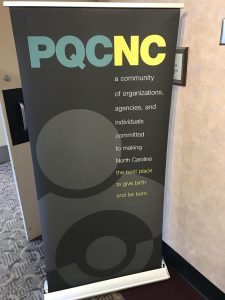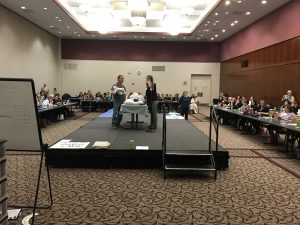 The Perinatal Quality Collaborative of North Carolina (PQCNC) team began planning their Postpartum Hemorrhage (PPH) Reduction Project in 2017. PQCNC’s mission is to make North Carolina the best place to give birth and be born. Focusing on collaboration, resource utilization and patient and family partnerships, PQCNC works with every delivery hospital and birth center across the state, connecting rural community health centers with large terciary centers to improve the care and outcomes of moms and babies.
The Perinatal Quality Collaborative of North Carolina (PQCNC) team began planning their Postpartum Hemorrhage (PPH) Reduction Project in 2017. PQCNC’s mission is to make North Carolina the best place to give birth and be born. Focusing on collaboration, resource utilization and patient and family partnerships, PQCNC works with every delivery hospital and birth center across the state, connecting rural community health centers with large terciary centers to improve the care and outcomes of moms and babies.
On March 28th, the team hosted an event at North Carolina State University’s McKimmon Center to create a dialog about ways to break down barriers and discuss methods to simulate PPH in over 50 of the registered obstetric units in attendance.
An exercise on estimated blood loss was set up by Kay Mitchell, a regional nurse educator from the Vidant Health system, at the beginning of the day and attendees estimated the examples seen on the table. A demonstration was provided of the volume several products could hold and attendees shared their estimates. This emphasized just how difficult it is to accurately determine blood loss and how important it is to standardize a protocol for quantitative blood loss.
Tara Bristol-Rouse and Jodi DeJoseph presented on the importance of completing a hemorrhage risk assessment at several points of care during a mother’s stay following the birth of her baby. Focusing on the importance of bridging the gap between clinical tasks and patient engagement, teams were provided an example of how to partner with patients and practice communication with family members while ensuring the clinical risk assessment tool is meaningful for patients.
 Nicole Jung and Gene Hobbs worked with the PQCNC team to present a simulation of a patient experiencing a PPH. The simulation provided an example or “how” teams can create meaningful opportunities for team reflection without the need for complicated equipment or huge amounts of time. The simulation debrief re-emphasized TeamSTEPPS(TM) principles and engaged the family standardized patient and family member.
Nicole Jung and Gene Hobbs worked with the PQCNC team to present a simulation of a patient experiencing a PPH. The simulation provided an example or “how” teams can create meaningful opportunities for team reflection without the need for complicated equipment or huge amounts of time. The simulation debrief re-emphasized TeamSTEPPS(TM) principles and engaged the family standardized patient and family member.
Huge thanks to the PQCNC team of Tara Bristol-Rouse MHA, Keith Cochran, Jodi DeJoseph MSN, RNC-NIC, Susan Gutierrez RN, Marty McCaffrrey MD and Arthur Ollendorf MD for hosting such an extremely valuable training event.
Slides presented throughout the day and more information about the project can be found by clicking here (“Learning session 2” under the “resources” section at the bottom of the page).
Monthly team building and training ideas, as well as how to support family members during a crisis, discussed in the event are available online by clicking here.
